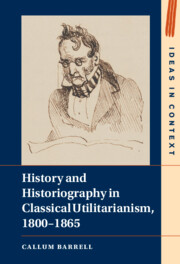44 results
Chapter 2 - The Engagement with Burke
-
- Book:
- Mary Wollstonecraft and Political Economy
- Published online:
- 15 February 2024
- Print publication:
- 22 February 2024, pp 50-75
-
- Chapter
- Export citation
6 - The Myth of “Salutary Neglect”: Empire and Revolution in the Long Eighteenth Century
- from Part II - The British Colonies
-
-
- Book:
- The Cambridge History of the Age of Atlantic Revolutions
- Published online:
- 20 October 2023
- Print publication:
- 09 November 2023, pp 189-206
-
- Chapter
- Export citation
The Parliamentary Regime: The Political Philosophy of Confederation
-
- Journal:
- Canadian Journal of Political Science/Revue canadienne de science politique / Volume 56 / Issue 3 / September 2023
- Published online by Cambridge University Press:
- 18 August 2023, pp. 550-570
-
- Article
- Export citation
3 - The Sublime in Eighteenth-Century English, Irish and Scottish Philosophy
- from Part I - The Sublime before Romanticism
-
-
- Book:
- The Cambridge Companion to the Romantic Sublime
- Published online:
- 06 July 2023
- Print publication:
- 20 July 2023, pp 41-52
-
- Chapter
- Export citation
2 - Conciliation after Hastings
-
- Book:
- The East India Company and the Politics of Knowledge
- Published online:
- 22 June 2023
- Print publication:
- 06 July 2023, pp 62-93
-
- Chapter
- Export citation
Introduction
-
- Book:
- Catharine Macaulay: Political Writings
- Published online:
- 23 February 2023
- Print publication:
- 02 March 2023, pp xi-xxxii
-
- Chapter
- Export citation
8 - Observations on the Reflections of the Right Hon. Edmund Burke on the Revolution in France (1790)
-
- Book:
- Catharine Macaulay: Political Writings
- Published online:
- 23 February 2023
- Print publication:
- 02 March 2023, pp 251-300
-
- Chapter
- Export citation
3 - Observations on a Pamphlet entitled ‘Thoughts on the Cause of the Present Discontents’ (1770)
-
- Book:
- Catharine Macaulay: Political Writings
- Published online:
- 23 February 2023
- Print publication:
- 02 March 2023, pp 109-123
-
- Chapter
- Export citation
Chapter 2 - Indulgence
- from Part I - Political and Fictional Relations
-
- Book:
- <i>The Postsecular Restoration and the Making of Literary Conservatism</i>
- Published online:
- 22 June 2023
- Print publication:
- 22 December 2022, pp 67-100
-
- Chapter
- Export citation
7 - Essay, Enlightenment, Revolution
- from Part II - The Work of the Essay
-
-
- Book:
- The Cambridge Companion to The Essay
- Published online:
- 27 October 2022
- Print publication:
- 03 November 2022, pp 111-125
-
- Chapter
- Export citation
Chapter 10 - Political Economy, the Family, and Sexuality
- from Part II - Contemporary Critical Perspectives
-
-
- Book:
- The Cambridge Companion to Literature and Economics
- Published online:
- 28 July 2022
- Print publication:
- 11 August 2022, pp 163-178
-
- Chapter
- Export citation
Chapter 8 - The Sublime
- from Part II - Development
-
-
- Book:
- Nature and Literary Studies
- Published online:
- 22 July 2022
- Print publication:
- 04 August 2022, pp 161-176
-
- Chapter
- Export citation
Chapter 2 - Commerce without Empire?
-
- Book:
- The Case of Ireland
- Published online:
- 27 January 2022
- Print publication:
- 17 February 2022, pp 59-99
-
- Chapter
- Export citation
Chapter 1 - The Enlightenment Critique of Empire in Ireland, c. 1750–1776
-
- Book:
- The Case of Ireland
- Published online:
- 27 January 2022
- Print publication:
- 17 February 2022, pp 23-58
-
- Chapter
- Export citation
Chapter 4 - Enlightenment against Revolution
-
- Book:
- The Case of Ireland
- Published online:
- 27 January 2022
- Print publication:
- 17 February 2022, pp 139-173
-
- Chapter
- Export citation
Chapter 1 - Jeremy Bentham on Historical Authority
- from Part I - Enlightened Historicisms
-
- Book:
- History and Historiography in Classical Utilitarianism, 1800–1865
- Published online:
- 24 September 2021
- Print publication:
- 07 October 2021, pp 23-58
-
- Chapter
- Export citation

History and Historiography in Classical Utilitarianism, 1800–1865
-
- Published online:
- 24 September 2021
- Print publication:
- 07 October 2021
2 - Republicanism
-
- Book:
- Foundations of American Political Thought
- Published online:
- 09 July 2021
- Print publication:
- 29 July 2021, pp 13-48
-
- Chapter
- Export citation
Chapter 17 - Politics
- from Part IV - Philosophy
-
-
- Book:
- Frederick Douglass in Context
- Published online:
- 16 June 2021
- Print publication:
- 08 July 2021, pp 209-219
-
- Chapter
- Export citation

Small World
- Ireland, 1798–2018
-
- Published online:
- 03 June 2021
- Print publication:
- 27 May 2021



